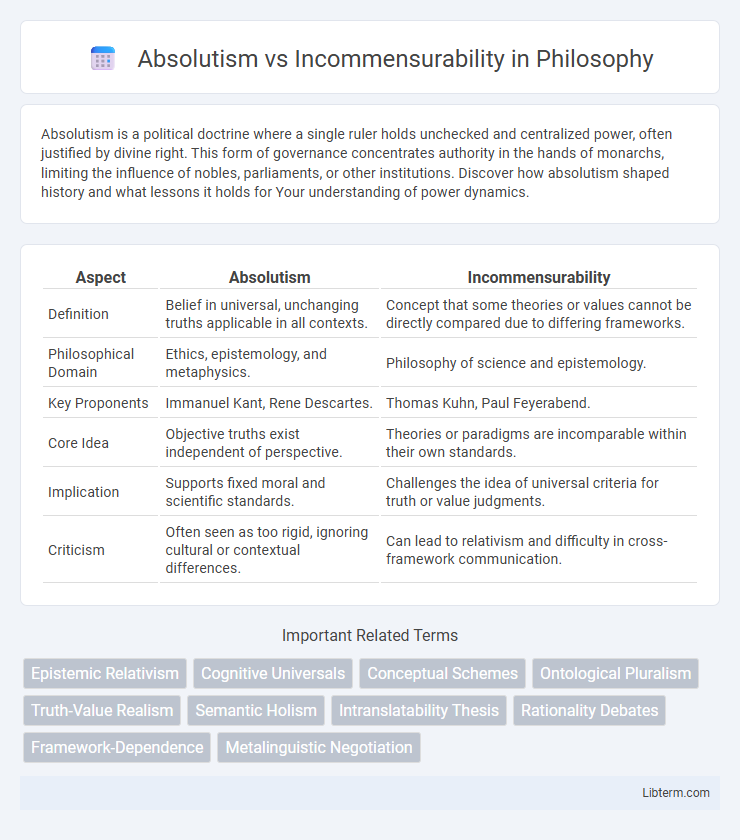Absolutism is a political doctrine where a single ruler holds unchecked and centralized power, often justified by divine right. This form of governance concentrates authority in the hands of monarchs, limiting the influence of nobles, parliaments, or other institutions. Discover how absolutism shaped history and what lessons it holds for Your understanding of power dynamics.
Table of Comparison
| Aspect | Absolutism | Incommensurability |
|---|---|---|
| Definition | Belief in universal, unchanging truths applicable in all contexts. | Concept that some theories or values cannot be directly compared due to differing frameworks. |
| Philosophical Domain | Ethics, epistemology, and metaphysics. | Philosophy of science and epistemology. |
| Key Proponents | Immanuel Kant, Rene Descartes. | Thomas Kuhn, Paul Feyerabend. |
| Core Idea | Objective truths exist independent of perspective. | Theories or paradigms are incomparable within their own standards. |
| Implication | Supports fixed moral and scientific standards. | Challenges the idea of universal criteria for truth or value judgments. |
| Criticism | Often seen as too rigid, ignoring cultural or contextual differences. | Can lead to relativism and difficulty in cross-framework communication. |
Defining Absolutism: Core Principles
Absolutism centers on the belief in fixed, universal truths that apply consistently across contexts, anchoring moral and epistemological judgments in objective standards. Core principles include the idea that certain values or facts are unchanging, independent of subjective perspectives or cultural differences. This framework contrasts sharply with relativist doctrines by asserting a definitive foundation for knowledge and ethics, emphasizing certainty and universality.
Understanding Incommensurability: Key Concepts
Incommensurability refers to the inability to directly compare or measure different paradigms or frameworks using a common standard, challenging the absolutist view that universal criteria can resolve all disagreements. Key concepts include the lack of a shared measure, resulting in communication barriers between competing theories, and the contextual nature of truth and meaning within distinct scientific or philosophical systems. This contrasts with absolutism, which asserts fixed, objective principles applicable across all contexts.
Historical Roots of Absolutist Thought
Absolutism, rooted in the political theories of the 16th and 17th centuries, finds its origins in the works of Jean Bodin and Thomas Hobbes, who emphasized centralized sovereign power as essential for societal order. This doctrine justified the divine right of kings, asserting that monarchs held unquestionable authority not subject to earthly challenge. The contrast with incommensurability highlights the rigid, universal claims of absolutism against the relativistic understanding of knowledge and values that resists uniform measurement or comparison.
Origins and Evolution of Incommensurability
The concept of incommensurability originated in the philosophy of science during the 20th century, primarily through the work of Thomas Kuhn and Paul Feyerabend, who argued that scientific paradigms are often incomparable due to differing standards and languages. This evolution of incommensurability challenged the absolutist view that scientific knowledge progresses through a linear accumulation of objective truths. The development of incommensurability highlights the complexity of scientific change, emphasizing paradigm shifts and the non-translatability of concepts across differing frameworks.
Absolutism in Ethics and Morality
Absolutism in ethics asserts that certain moral principles are universally valid and unchanging regardless of context or culture, emphasizing objective standards of right and wrong. This perspective contrasts with relativism and incommensurability by maintaining fixed ethical norms that apply universally, such as Kantian deontology or natural law theory. Absolutism provides a clear framework for evaluating moral actions based on absolute values like justice, duty, and human rights, resisting the idea that moral truths vary between societies or situations.
Incommensurability in Science and Philosophy
Incommensurability in science and philosophy refers to the idea that certain theories or paradigms are so fundamentally different in their concepts, methods, or standards that they cannot be directly compared or measured against one another. Thomas Kuhn popularized this concept through his analysis of scientific revolutions, emphasizing that competing paradigms often operate with distinct vocabularies and frameworks, making translation between them problematic. This challenges absolutist views that assume a single, universal standard for evaluating truth or progress in knowledge.
Major Figures Influencing Both Perspectives
Thomas Hobbes and Immanuel Kant are key figures advocating Absolutism, emphasizing universal laws and objective moral truths in political and ethical philosophy. Friedrich Nietzsche and Ludwig Wittgenstein challenge these absolutes, promoting Incommensurability through perspectives highlighting the plurality of values and meaning systems that resist direct comparison. Their works collectively shape ongoing debates on the possibility of universal standards versus the legitimacy of diverse, incomparable frameworks in philosophy.
Key Debates: Conflict or Compatibility?
Key debates on Absolutism versus Incommensurability center on whether objective, universal truths can coexist with the idea that competing paradigms or values are incommensurable, meaning they lack a common measure for comparison. Philosophers argue that Absolutism demands fixed standards for truth and morality, while Incommensurability challenges this by emphasizing the incomparability of different frameworks or belief systems. The core conflict involves assessing if these concepts are fundamentally opposed or if they can be integrated through new epistemological approaches that accommodate both universal principles and contextual diversity.
Implications for Contemporary Theory
Absolutism asserts fixed, universal values or truths that guide ethical and epistemological frameworks, creating clear standards for judgment and decision-making. In contrast, incommensurability highlights the fundamental incompatibility and non-comparability of differing paradigms or value systems, challenging the possibility of objective evaluation across diverse contexts. The tension between these perspectives influences contemporary theory by questioning the feasibility of universal principles and fostering pluralistic approaches that accommodate multiple, conflicting worldviews in ethics, science, and cultural analysis.
Absolutism vs Incommensurability: Future Directions
Future directions in the debate between Absolutism and Incommensurability emphasize developing frameworks that bridge absolute standards and contextual variability, integrating philosophical rigor with practical adaptability. Emerging research explores hybrid models that acknowledge the limits of absolute measures while accommodating diverse value systems and epistemologies to facilitate cross-disciplinary dialogue. These approaches aim to refine decision-making processes by balancing universal principles with the inherent complexity and plurality of human experiences.
Absolutism Infographic

 libterm.com
libterm.com